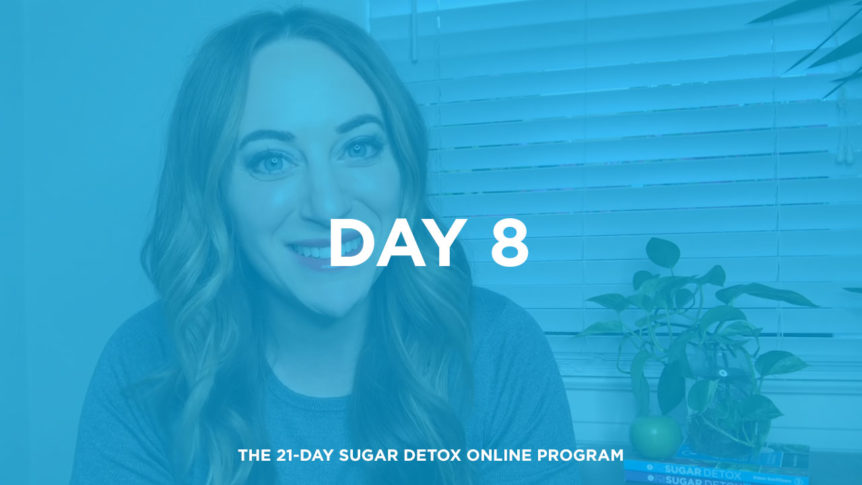What to Expect:
“Wow, almost a whole week down. I feel awesome! But my digestion, not so much!”
You may experience: Digestive issues such as bloating, constipation, or diarrhea. These symptoms may be discouraging, but there’s hope!
Your best bet: Follow the advice given today. We’ve got your digestion covered!
Today's Lesson:
Digestion in question
Digestion is a hot topic on a 21DSD! I would be remiss if I didn’t tackle this sensitive subject, since it’s very likely that you’ll run into some ups and downs over the course of this program. While many people don’t experience any disruption at all during the program, it is common that issues happen.
The two most common digestive concerns that can arise on the 21DSD are:
- a serious “back up” (aka constipation)
- “everybody out” (aka diarrhea or loose stools)
These changes are the result of an increase in insoluble fiber from vegetables and a decrease in simple sugars (from the refined carbs you’ve eliminated), along with shifts in your hydration—reducing carb intake means that you need to drink more water to maintain hydration.
I know it’s tough to read about this in the middle of some pep talks about your program and cozied up next to some yummy recipes on the page, but bear with me! Now is the time when these issues tend to crop up, and I’d like to make sure you’re equipped with the tools you need to best handle them.
Tips for handling constipation:
- Add fermented foods like raw sauerkraut, kombucha, or fermented pickles to your daily meals. Note that all of these are sold in the refrigerated section of grocery stores. (See 21daysugardetox.com/favorite-foods for recommended brands.)
- Include foods that contain soluble fiber, such as carrots, beets, parsnips, butternut squash, and sweet potatoes, in at least two meals per day.
- Include foods that contain prebiotic fiber, such as asparagus, jicama, artichokes, onions, and garlic.
- In at least one meal per day, include foods that contain resistant starches, such as a green-tipped banana or white potatoes that have been cooked and then cooled (all levels), or brown rice or legumes that have been cooked and then cooled (Level 1). Cooling these foods after cooking increases their gut bacteria–friendly nature, encouraging improved digestive function. Note that cooked-and-cooled starches can be reheated before eating to receive the same benefit.
All of the above will help to support a healthy balance of bacteria in the gut and promote more regular bowel movements.
Tips for handling diarrhea or loose stools:
- Add a cup or more per day of bone broth. It can be sipped alone or consumed in soup or slow-cooked foods.
- Drink herbal, peppermint, chamomile, or ginger teas.
- Add fermented foods like raw sauerkraut, kombucha, or fermented pickles to your daily meals. Note that all of these are sold in the refrigerated section of grocery stores. (See 21daysugardetox.com/favorite-foods for recommended brands.)
- Eat fennel or fennel seeds with or after meals. Raw is okay.
- Consider supplementing with L-glutamine and a high-quality probiotic that contains acidophilus.
- Avoid leafy greens, like kale and collards—eat more cooked foods than raw salads.
- Avoid nuts and seeds and legumes (even if you’re Level 1).
All of the above will help to heal an irritated digestive system. Start with the steps that are easiest for you, see how you feel, and go from there.
Your digestion may be moving along perfectly, and if so, great! But if you are experiencing constipation or diarrhea, don’t worry; these changes in digestive function are common and to be expected when the food on your plate every day changes. The more different your 21DSD food is from what you were eating prior to the program, the more it may impact your gut. But, rest assured, the foods included in this program contribute plenty of healthy carbohydrates, fats, and fiber to keep your digestive system moving properly! Sometimes you just need to make a few small changes to get yourself back on track.
The Dish from Diane:
“I’m experiencing some not-so-pleasant effects from these healthy dietary changes. Diane, what gives?!”
I hear you. It seems backward that you might physically experience something negative when you’re eating healthier foods! How can that be?! Well, our bodies are really great at adapting to whatever it is we’re doing, but that’s not always a good thing. When we eat unhealthy food for a long time, our bodies get used to it, and in the short term, eating highquality, nutrient-dense foods can cause it to scramble to adapt to the new, healthier input. And often it does take more than three weeks for your digestion to find a new normal when you ditch the highly processed carbs that were feeding your gut bacteria in a different way.
For many people, this change is miraculous and only has positive effects! But for others, this stage in the detox may make you question your decision to take it on. Heed today’s advice and I promise things will regulate again before you know it!

Today's Checklist:
- Address your digestion. If things don’t feel normal, take the steps in today’s lesson to remedy it!
- Post to social media using the hashtag #21DSD about your day 8 meals. If you’ve got a tip for others on what got you through week 1, share it!
For even more support, visit the Online Facebook Community!

